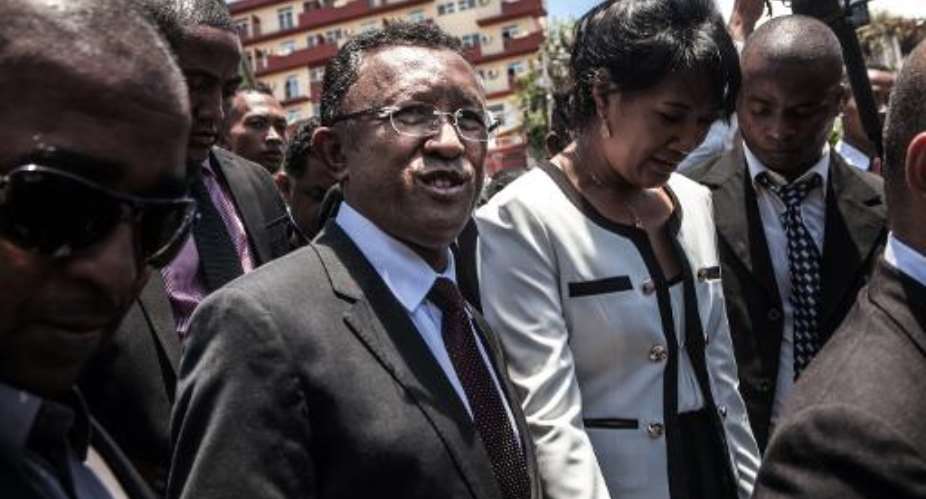Antananarivo (AFP) - Madagascar on Friday declared Hery Rajaonarimampianina, a Canadian-educated former finance minister backed by strongman Andry Rajoelina, as the country's new president, after elections aimed at restoring democracy.
Rajaonarimampianina, 55, was "declared officially president of the Republic of Madagascar," with just over 53 percent of the votes, said the president of the electoral court, Francois Rakotozafy.
The new president-elect vowed to work together with his opponents and bring prosperity to the Indian Ocean island nation.
"I will be the president of all of you without distinction," he said in Malagasy after the court's announcement. "I'm asking for your help so we can develop the country."
His backer, incumbent strongman Rajoelina, seized power from then president Marc Ravalomanana in 2009, plunging Madagascar into political and economic crisis.
Their proxy candidates dominated the vote, after the two rivals were prevented from running for office due to international pressure over fears of a return to violence.
The announcement of the election result had been delayed pending the court's ruling on allegations of voting irregularities, following a challenge by runner-up Robinson Jean Louis.
Jean Louis, 61, who was backed by Ravalomanana and garnered 46.51 percent of the vote, on Friday rejected the court's declaration.
"We contest this result because none of our complaints were heard. They said there wasn't proof but we've given a lot of proof," he said.
Rajaonarimampianina's inauguration "will be void", he added.
Despite the mud-slinging, international observers gave the vote the green light and called on the parties to respect the electoral process.
As long as serious violence is avoided, the return to democracy is likely to see Madagascar allowed back into the African Union and the Southern African Development Community, which suspended the country after the coup.
It will also mean the restoration of vital foreign aid, though how to kickstart its economy is less clear.
The World Bank has estimated that the political turmoil cost Madagascar around $8 billion in lost growth.
The economy grew 3.1 percent in 2012, lagging well behind most fast-growing African nations.
Nine out of 10 people in Madagascar live on less than $2 a day.
The two top presidential candidates had promised a vast infrastructure construction programme for the island, which is roughly the size of Ukraine and has a population of 22 million.
But the country's turbulent politics -- dominated by the rivalry between Rajoelina and Ravalomanana -- looks set to continue.
During last December's polls voters also selected 151 lawmakers in a single-round parliamentary election.
Although prevented from running as president, Rajoelina may yet make a comeback on the political scene. His camp last week claimed to have won enough parliamentary seats to name a prime minister.
Rajoelina has hinted that he could stay in power as premier at the side of his candidate, a scenario reminiscent of Russia, where President Vladimir Putin served as prime minister under president Dmitry Medvedev before returning as head of state in 2012.





 Dumsor: Don't rush to demand timetable; the problem may be temporary — Atik Moha...
Dumsor: Don't rush to demand timetable; the problem may be temporary — Atik Moha...
 Space X Starlink’s satellite broadband approved in Ghana — NCA
Space X Starlink’s satellite broadband approved in Ghana — NCA
 2024 election will be decided on the grounds of the economy; choice of running m...
2024 election will be decided on the grounds of the economy; choice of running m...
 Dumsor: We're demanding less; just give us a timetable — Kwesi Pratt to ECG
Dumsor: We're demanding less; just give us a timetable — Kwesi Pratt to ECG
 Do I have to apologise for doing my security work, I won’t – Simon Osei-Mensah r...
Do I have to apologise for doing my security work, I won’t – Simon Osei-Mensah r...
 All my businesses have collapsed under Akufo-Addo — NDC Central regional chair
All my businesses have collapsed under Akufo-Addo — NDC Central regional chair
 Military, Prison Officers clash in Bawku, three injured
Military, Prison Officers clash in Bawku, three injured
 GRA-SML contract: MFWA files RTI request demanding KPMG report
GRA-SML contract: MFWA files RTI request demanding KPMG report
 Court threatens to call second accused to testify if NDC's Ofosu Ampofo fails to...
Court threatens to call second accused to testify if NDC's Ofosu Ampofo fails to...
 Family accuses hospital of medical negligence, extortion in death of 17-year-old...
Family accuses hospital of medical negligence, extortion in death of 17-year-old...
